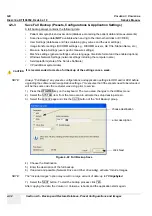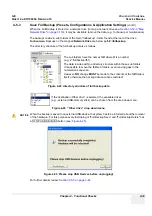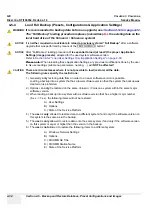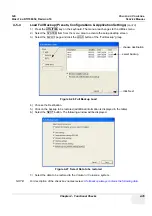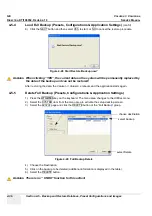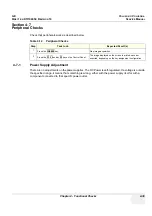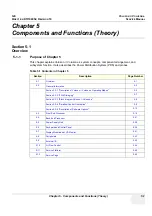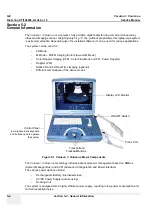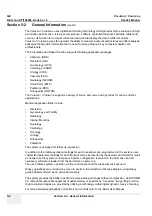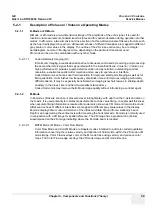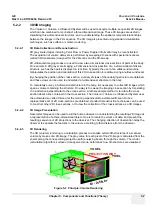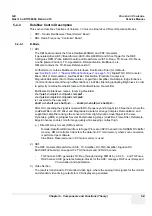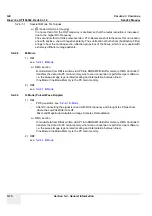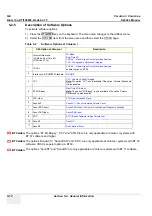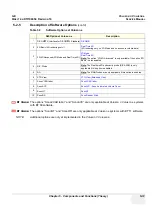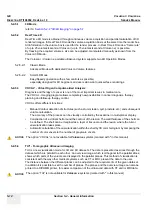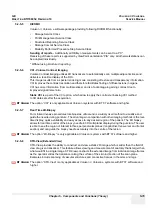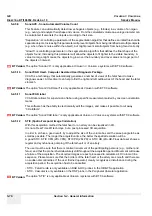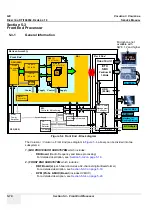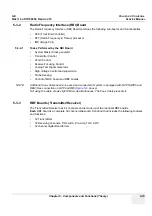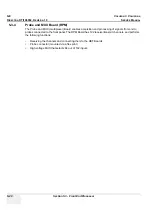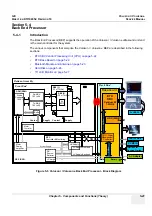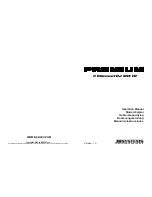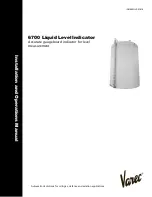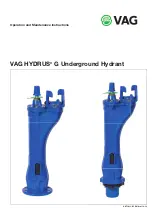
GE
V
OLUSON
i / V
OLUSON
e
D
IRECTION
KTI106052, R
EVISION
10
S
ERVICE
M
ANUAL
5-6
Section 5-2 - General Information
5-2-1-3
Color Doppler Mode
Color Doppler is used to detect motion presented as a two-dimensional display.
There are two applications of this technique:
•
Color Flow Mode (C) - used to visualize blood flow velocity and direction
•
Power Doppler (PD) - used to visualize the spatial distribution of blood
5-2-1-3-1
Color Flow Mode
A real-time two-dimensional cross-section image of blood flow is displayed. The 2D cross-section is
presented as a full color display, with various colors being used to represent blood flow (velocity,
variance, power and/or direction). Often, to provide spatial orientation, the full color blood flow cross-
section is overlaid on top of the grayscale cross-section of soft tissue structure (2D echo). For each pixel
in the overlay, the decision of whether to display color (Doppler), gray scale (echo) information or a
blended combination is based on the relative strength of return echoes from the soft tissue structures
and from the red blood cells. Blood velocity is the primary parameter used to determine the display
colors, but power and variance may also used. A high pass filter (wall filter) is used to remove the
signals from stationary or slowly moving structures. Tissue motion is discriminated from blood flow by
assuming that blood is moving faster than the surrounding tissue, although additional parameters may
also be used to enhance the discrimination. Color flow can be used in combination with 2D and Spectral
Doppler modes as well as with 3D mode.
5-2-1-3-2
Power Doppler
A real-time two dimensional cross-section of blood flow is displayed. The 2D cross-section is presented
as a full color display, with various colors being used to represent the power in blood flow echoes. Often,
to provide spatial orientation, the full color blood flow cross-section is overlaid on top of the gray scale
cross-section of soft tissue structure (2D echo). For each pixel in the overlay, the decision of whether
to display color (Doppler power), gray scale (echo) information or a blended combination is based on
the relative strength of return echoes from the soft-tissue structures and from the red blood cells. A high
pass filter (wall filter) is used to remove the signals from stationary or slowly moving structures.
Tissue motion is discriminated from blood flow by assuming that blood is moving faster than the
surrounding tissue, although additional parameters may also be used to enhance the discrimination.
The power in the remaining signal after wall filtering is then averaged over time (persistence) to present
a steady state image of blood flow distribution. Power Doppler can be used in combination with 2D and
Spectral Doppler modes as well as with 3D mode.
5-2-1-4
Pulsed (PW) Doppler
PW Doppler processing is one of two spectral Doppler modalities, the other being CW Doppler. In
spectral Doppler, blood flow is presented as a scrolling display, with flow velocity on the Y-axis and time
on the X-axis. The presence of spectral broadening indicates turbulent flow, while the absence of
spectral broadening indicates laminar flow. PW Doppler provides real time spectral analysis of pulsed
Doppler signals. This information describes the Doppler shifted signal from the moving reflectors in the
sample volume. PW Doppler can be used alone but is normally used in conjunction with a 2D image
with an M-line and sample volume marker superimposed on the 2-D image indicating the position of the
Doppler sample volume. The sample volume size and location are specified by the operator. Sample
volume can be overlaid by a flow direction cursor which is aligned, by the operator, with the direction of
flow in the vessel, thus determining the Doppler angle. This allows the spectral display to be calibrated
in flow velocity (m/sec.) as well as frequency (Hz). PW Doppler also provides the capability of
performing spectral analysis at a selectable depth and sample volume size. PW Doppler can be used
in combination with 2D and Color Flow modes.
Summary of Contents for Voluson i BT06
Page 2: ......
Page 11: ...GE VOLUSON i VOLUSON e DIRECTION KTI106052 REVISION 10 SERVICE MANUAL ix ZH CN KO...
Page 44: ...GE VOLUSON i VOLUSON e DIRECTION KTI106052 REVISION 10 SERVICE MANUAL xlii Table of Contents...
Page 514: ...GE VOLUSON i VOLUSON e DIRECTION KTI106052 REVISION 10 SERVICE MANUAL IV Index...
Page 515: ......

